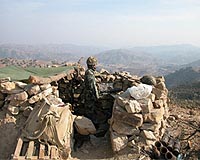| . |  |
. |
Washington (AFP) May 21, 2009 NATO has failed to stem the vast opium trade in Afghanistan that helps finance Taliban insurgents despite an eight-year effort, the top US military officer said on Thursday. Countering narcotics networks is crucial to weakening the Taliban and allied insurgent groups, Admiral Mike Mullen, chairman of the US Joint Chiefs of Staff, told a Senate hearing. "Strategically my view is it has to be eliminated," Mullen said. "We have had almost no success in the last seven or eight years doing that, including this year's efforts," he said. Afghanistan produces 90 percent of the world's opium, the raw material for heroin across Europe, Central Asia and the Middle East while cash from the trade helps insurgents buy weapons, according to officials. The Taliban, ousted from power seven years ago by a US-led coalition, has been reaping close to 100 million dollars (77 million euros) a year from the opium trade. A key element in tackling the problem was to offer Afghan farmers alternatives to the opium crop, the admiral said. "We've got to have a concerted effort, not only the United States, the international community, to displace it (opium crop) and to do it in a way that makes sense," Mullen said. Officials in President Barack Obama's administration say they want to emphasize alternative crops and avoid aggressive eradication operations that could alienate Afghans. Mullen said NATO-led forces have stepped up operations against drug networks after the alliance last year eased rules for targeting narcotics rings. "Recent rules of engagement have allowed us to go after labs, people associated with labs," he told the Senate Foreign Relations Committee. "That's a step in the right direction but until we are able to execute a comprehensive agricultural strategy, it's going to be very difficult to really have a strategic impact on that." The bulk of Afghanistan's opium production is based in the south of the country, which is also the heart of the Taliban-led insurgency. Obama has ordered more than 21,000 additional US troops to Afghanistan, with most of the extra troops deploying to the south. Share This Article With Planet Earth
Related Links News From Across The Stans
 Wounded Pakistan soldiers recall stiff resistance
Wounded Pakistan soldiers recall stiff resistanceRawalpindi, Pakistan (AFP) May 21, 2009 "They used to attack early in the morning or after dark. They would always go for an ambush," said Lieutenant Zaigham, wounded in battle with the Taliban and lying in a Pakistani hospital. Zaigham -- who did not give his full name -- sustained shrapnel wounds from fierce street fighting in the Swat valley and is a patient at the Combined Military Hospital in Rawalpindi, away from the combat ... read more |
|
| The content herein, unless otherwise known to be public domain, are Copyright 1995-2009 - SpaceDaily. AFP and UPI Wire Stories are copyright Agence France-Presse and United Press International. ESA Portal Reports are copyright European Space Agency. All NASA sourced material is public domain. Additional copyrights may apply in whole or part to other bona fide parties. Advertising does not imply endorsement,agreement or approval of any opinions, statements or information provided by SpaceDaily on any Web page published or hosted by SpaceDaily. Privacy Statement |